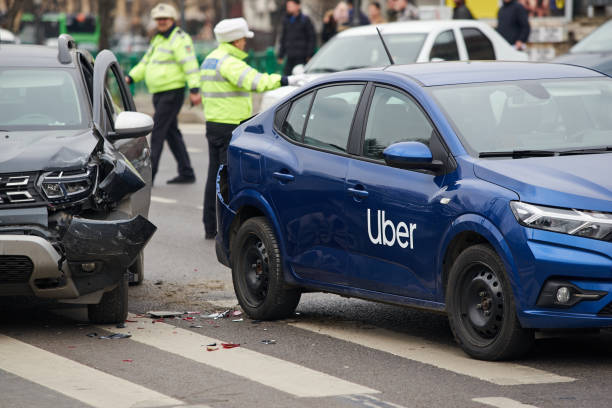Monroe Rideshare Accident Lawyer
In Monroe, winter turns familiar roads into hazardous corridors where rideshare drivers and riders face black ice and leaf-slick stretches. Route 25 becomes a particular pinch point during thaw-and-freeze cycles, with merged traffic near the town center and sudden slides onto shoulders. An investigative eye sees how modest fender-benders cascade: glass, soft-tissue strains, and whiplash, often with delayed ambulance calls as conditions deteriorate during evening commutes.
At Masuk High School, postgame rideshare pickups on slick sidewalks are a predictable scene in late November. I’ve watched parents and student drivers jockey for curb space while slips produce sprained ankles and concussions that often look minor until transport logistics complicate matters. Bystanders and drivers describe slow rideshare arrival times, and those delays shape initial triage decisions and whether an injured teen is sent by private car or ambulance.
When collisions or falls require hospital attention, transport patterns matter. Danbury Hospital is the nearest emergency destination for many Monroe residents, but winter storms can drive crews to reroute or arrange interfacility transfers to tertiary centers farther afield. That means longer on-scene times, more pain en route, and different documentation trails — all factors that shape how soft-tissue injuries, fractures, and head traumas are triaged and sent for imaging or specialist care.
Along Lake Zoar and the town’s quieter residential lanes, winter access issues turn routine rehabilitation into a logistics problem: canceled rideshare pickups, icy driveways that prevent outpatient PT attendance, and vendors unfamiliar with private accessways. I report from those follow-ups: delayed therapy prolongs stiffness after rotator-cuff strains, and repeated transfers between clinics and rehab units increase fatigue. The practical record is simple—note pickup times, transfer destinations, and missed appointments to clarify how winter delays affected recovery.
Do you need a Monroe rideshare accident lawyer? If you or a loved one has been involved in an accident with an Uber, Lyft, or rideshare driver—whether as a passenger, another driver, or even a pedestrian—you have rights. Understanding these rights and navigating the complexities of rideshare accident claims requires the help of an experienced attorney. At Etemi Law, we are dedicated to helping victims of rideshare accidents receive the compensation they deserve.
Call us today at (203) 409-8424 for a


The Reality of Rideshare Accidents
Uber and Lyft have revolutionized transportation, providing millions of rides daily across the U.S. However, with the rise of these services, the number of rideshare-related accidents has also increased. Research from Rice University and the University of Chicago suggests that ridesharing services have contributed to a 2-3% increase in U.S. traffic fatalities since 2011, leading to up to 1,100 deaths annually.
Common Causes of Rideshare Accidents
Uber and Lyft drivers often operate under challenging conditions, increasing their risk of accidents. Some of the most common causes include:
- Distracted Driving – Relying on GPS, accepting ride requests, and managing passengers can divert a driver’s attention.
- Driver Fatigue – Many rideshare drivers work long hours or multiple jobs, leading to drowsy driving.
- Unfamiliar Routes – Navigating new areas can cause sudden stops or erratic driving behavior.
- Poor Vehicle Maintenance – Rideshare drivers are responsible for keeping their vehicles in good working condition, but lapses can lead to preventable accidents.
Connecticut Rideshare Laws and Regulations
Connecticut has strict laws governing rideshare companies and their drivers. These include:
- Mandatory Background Checks – Uber and Lyft must conduct background checks on all drivers, including a criminal record and driving history review.
- Vehicle Safety Requirements – Vehicles must pass inspections and meet specific safety criteria.
- Insurance Coverage – Rideshare companies must provide at least $1 million in liability coverage when drivers are transporting passengers.
- Driver Hour Limits – Uber and Lyft drivers can work a maximum of 14 consecutive hours and 16 hours in a 24-hour period to prevent fatigue-related accidents.
Who is Liable in a Rideshare Accident?
Determining liability in an Uber or Lyft accident can be complex, as multiple insurance policies may be involved. Our legal team at Etemi Law will investigate your case to establish liability and maximize your compensation.
If Another Driver is At Fault
- The at-fault driver’s insurance is the first line of compensation.
- If the at-fault driver is uninsured or underinsured, Uber/Lyft’s uninsured motorist coverage may apply.
If the Rideshare Driver is At Fault
- If the driver was logged into the app and waiting for a ride request, Uber/Lyft provides $50,000 per person/$100,000 per accident in bodily injury coverage.
- If the driver was transporting a passenger, Uber/Lyft provides $1 million in liability coverage.
- If the driver was off duty, their personal auto insurance applies.
Why You Need a Monroe Uber and Lyft Accident Lawyer
Rideshare accident cases involve multiple insurance companies and complicated liability issues. Insurance companies often try to minimize payouts, but with an experienced attorney from Etemi Law, you can fight for the full compensation you deserve.
Our legal team will: ✅ Investigate the accident thoroughly ✅ Obtain key evidence, including rideshare records and driver logs ✅ Negotiate aggressively with insurance companies ✅ Take your case to court if necessary
Contact Etemi Law Today
If you or a loved one has been injured in an Uber or Lyft accident, don’t wait. Protect your rights and get the compensation you deserve. Contact Etemi Law today for a free consultation.
📞 Call us at (203) 409-8424 💻 Visit us online to schedule your case review


